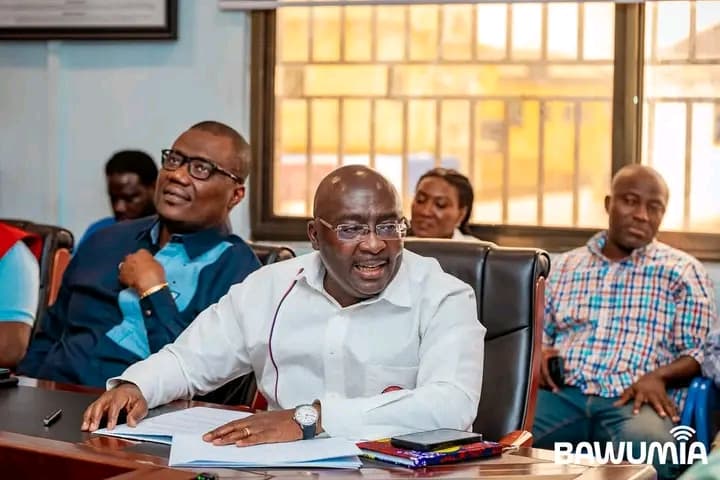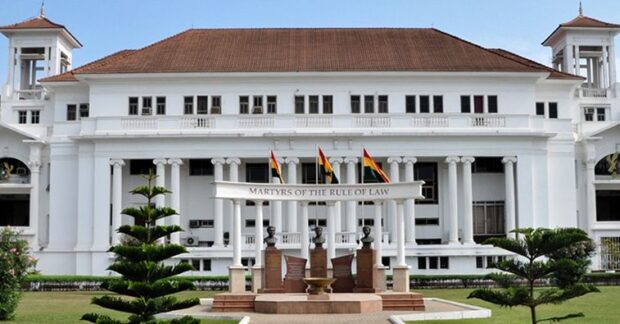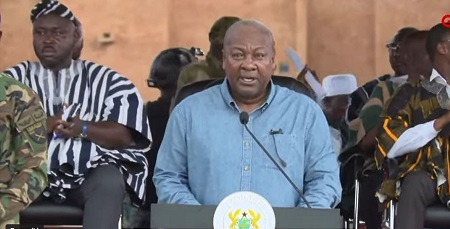
Dr. Mahamudu Bawumia, Ghana’s Vice President and a leading figure in the New Patriotic Party (NPP), has openly acknowledged that the party’s defeat in the 2024 general elections was largely due to the high cost of living and a perception of arrogance among those in power.
Addressing party members during a recent internal review meeting, Dr. Bawumia referenced multiple post-election reports and independent assessments that pointed to widespread public dissatisfaction with the government’s economic management and attitude. According to him, these two critical factors—soaring living expenses and a disconnection from the ordinary citizen—played decisive roles in shaping voter sentiment.
“Every single report we have received, both internal and external, points to the fact that the high cost of living weighed heavily on the electorate,” Dr. Bawumia said. “Added to that was the perception that we became arrogant in our governance, ignoring the real struggles of the people.”
Dr. Bawumia emphasized that while various achievements were chalked up during the NPP’s time in office, these successes were overshadowed by daily hardships faced by Ghanaians. From the rising prices of essential goods to the increasing burden of utility tariffs, many citizens found it difficult to meet basic needs, leading to widespread disillusionment.
He further stressed that the image of the government as detached and unresponsive severely damaged public trust. “Leadership must always be humble and in tune with the people’s reality,” he added, urging the next generation of leaders within the party to learn critical lessons from the defeat.
Moving forward, Dr. Bawumia called for a complete re-evaluation of policies and political culture within the NPP. He proposed deeper engagement with grassroots supporters, swift action to tackle economic hardships, and cultivating a leadership style that values humility and empathy over power and prestige.
As preparations begin for the next electoral cycle, his remarks serve as a sobering reminder that political success in Ghana’s vibrant democracy hinges not just on policies and programs, but equally on the connection leaders maintain with the everyday struggles and aspirations of the people.
About the author
Tyler Perry’s Straw: A Piercing Cry Against Racism and Injustice in Black America
Tyler Perry's Netflix drama Straw centers on Janiyah Wiltkinson (played by Taraji P. Henson), a Black single mother whose day spirals out of control amid poverty, systemic neglect, and racial bias—all culminating in a gripping bank standoff. The film’s shocking twist and emotional storytelling have resonated widely. 1. Authentic Depiction of Systemic Racism & Mental Health Straw explores how racial and economic injustice intersect to break a Black mother’s spirit. Critics note it “captures the adage of bad things happening to good people” under systemic oppression. Janiyah’s psychological collapse is depicted with stark realism, highlighting mental health struggles amplified in Black women facing societal neglect. 2. Taraji P. Henson’s Heart-Wrenching Performance Henson carries the film with emotional depth, embodying exhaustion, rage, and grief from Janiyah’s relentless challenges. Her performance anchors the narrative—even those who critique the storytelling style praise her […]
Ahmad June 15, 2025
Parliament to Vet Seven Supreme Court Nominees Beginning Monday, June 16
Starting Monday, June 16, 2025, Ghana’s Appointments Committee of Parliament will begin a three‑day vetting exercise for seven Supreme Court nominees, all currently serving as Justices on the Court of Appeal. 1. Who’s Being Vetted? All seven nominees are Appeal Court judges elevated by President John Dramani Mahama under Article 144(2) of the 1992 Constitution. Their names are: Justice Sir Dennis Dominic Adjei Justice Gbiel Simon Suurbaareh Justice Senyo Dzamefe Justice Kweku Tawiah Ackaah‑Boafo Justice Philip Bright Mensah Justice Janapare Bartels‑Kodwo Justice Hafisata Amaleboba 2. Purpose & Structure of the Hearings Over three days (June 16–18), the committee will scrutinize each nominee’s: Judicial competence and experience Knowledge of constitutional and human rights law Integrity and impartiality Judicial philosophy and past rulings Public engagement is expected, with citizens and legal stakeholders urged to submit observations and poses questions to the nominees. 3. […]
Ahmad June 15, 2025
Minnesota Lawmaker Killed, Another Injured in Targeted Political Shootings
A politically motivated attack in Minnesota has left Democratic Rep. Melissa Hortman and her husband Mark dead, and State Senator John Hoffman and his wife Yvette critically injured, in a shocking breach of domestic political security. 1. The Incidents Around 2 a.m. local time on June 14, a gunman impersonating a police officer opened fire at separate residences in Champlin and Brooklyn Park, targeting Democratic lawmakers. Sen. John Hoffman and his wife survived and underwent surgery in critical condition. At the second site, Rep. Melissa Hortman, former Minnesota House Speaker, and her husband were found dead. 2. The Suspect & Motive The suspect has been identified as 57‑year‑old Vance Luther Boelter, who impersonated a police officer using a fake squad car and uniform. His vehicle contained a manifesto and hit list featuring about 70 names—including lawmakers, abortion activists, and public […]
Ahmad June 15, 2025
Seven Lawra SHS Students Feared Dead After Canoe Capsizes on Black Volta
A routine morning exercise turned into a tragedy for Lawra Senior High School on Saturday, June 14, 2025, when ten cadet students attempted to cross the Black Volta River near Dikpe in a small canoe. The boat capsized mid-river, and although three students swam to safety, seven are feared drowned. 1. What Happened During their regular jogging routine, the students spotted a canoe in use and spontaneously decided to cross. Midway, the small, overloaded canoe capsized, plunging all ten into the strong Volta current. Three survived, but seven were swept away. 2. Emergency Response Local authorities—including Ghana Police and NADMO—have mobilised divers and volunteers for a full-scale search operation. The Black Volta’s strong currents and lack of safety gear have complicated rescue efforts. 3. Recovery So Far Bodies Retrieved: At least four bodies (two boys, two girls) were recovered. Still Missing: […]
Ahmad June 15, 2025
Mahama Warns Ghana Could Feel Oil Price Shock from Israel–Iran Conflict
President John Dramani Mahama has cautioned that escalating military exchanges between Israel and Iran are already lifting global crude oil prices, posing a real threat to Ghana's economic recovery and domestic fuel affordability. 1. Global Oil Prices on the Upswing The recent missile attacks have triggered a noticeable uptick in Brent and WTI crude prices—by over 7–10%, the most significant jump since the 2022 Ukraine crisis. Market fears center on potential supply disruptions in the Strait of Hormuz and broader Middle East energy infrastructure. 2. Ghana Is Not Immune Despite being a crude oil producer, Ghana remains a net importer of refined petroleum. Mahama warned that surging global oil rates could reverse recent economic gains and impact domestic fuel prices. 3. Ministerial Directives Issued Recognizing the urgency, Mahama has ordered the Ministers of Finance and Energy to: Model the conflict’s […]
Ahmad June 15, 2025
Trump Eyes Travel Ban Expansion: 36 More Countries, Ghana Included
The Trump administration is considering expanding its existing travel ban to include 36 more countries, including Ghana, according to a State Department memo highlighted by The Washington Post and other outlets. This marks a significant escalation following the reinstatement of the initial ban on 12 countries in early June. 1. Why These Countries? The memo—signed by Secretary of State Marco Rubio—suggests inclusion is based on concerns like: Unreliable identity documents or weak government authority High visa overstay rates in the U.S. Reports of antisemitic or anti-American activity by nationals from these countries . 2. Countries under Review Among the 36 flagged are 25 African nations, including Ghana, Nigeria, Egypt, and Senegal, as well as countries across the Caribbean, Central Asia, and the Pacific. 3. What Happens Next? Governments of these countries have been given 60 days to submit plans addressing […]
Ahmad June 15, 2025
Related
Parliament to Vet Seven Supreme Court Nominees Beginning Monday, June 16
Starting Monday, June 16, 2025, Ghana’s Appointments Committee of Parliament will begin a three‑day vetting exercise for seven Supreme Court nominees, all currently serving as Justices on the Court of Appeal. 1. Who’s Being Vetted? All seven nominees are Appeal Court judges elevated by President John Dramani Mahama under Article 144(2) of the 1992 Constitution. Their names are: Justice Sir Dennis Dominic Adjei Justice Gbiel Simon Suurbaareh Justice Senyo Dzamefe Justice Kweku Tawiah Ackaah‑Boafo Justice Philip Bright Mensah Justice Janapare Bartels‑Kodwo Justice Hafisata Amaleboba 2. Purpose & Structure of the Hearings Over three days (June 16–18), the committee will scrutinize each nominee’s: Judicial competence and experience Knowledge of constitutional and human rights law Integrity and impartiality Judicial philosophy and past rulings Public engagement is expected, with citizens and legal stakeholders urged to submit observations and poses questions to the nominees. 3. […]
Ahmad June 15, 2025
Seven Lawra SHS Students Feared Dead After Canoe Capsizes on Black Volta
A routine morning exercise turned into a tragedy for Lawra Senior High School on Saturday, June 14, 2025, when ten cadet students attempted to cross the Black Volta River near Dikpe in a small canoe. The boat capsized mid-river, and although three students swam to safety, seven are feared drowned. 1. What Happened During their regular jogging routine, the students spotted a canoe in use and spontaneously decided to cross. Midway, the small, overloaded canoe capsized, plunging all ten into the strong Volta current. Three survived, but seven were swept away. 2. Emergency Response Local authorities—including Ghana Police and NADMO—have mobilised divers and volunteers for a full-scale search operation. The Black Volta’s strong currents and lack of safety gear have complicated rescue efforts. 3. Recovery So Far Bodies Retrieved: At least four bodies (two boys, two girls) were recovered. Still Missing: […]
Ahmad June 15, 2025
Mahama Warns Ghana Could Feel Oil Price Shock from Israel–Iran Conflict
President John Dramani Mahama has cautioned that escalating military exchanges between Israel and Iran are already lifting global crude oil prices, posing a real threat to Ghana's economic recovery and domestic fuel affordability. 1. Global Oil Prices on the Upswing The recent missile attacks have triggered a noticeable uptick in Brent and WTI crude prices—by over 7–10%, the most significant jump since the 2022 Ukraine crisis. Market fears center on potential supply disruptions in the Strait of Hormuz and broader Middle East energy infrastructure. 2. Ghana Is Not Immune Despite being a crude oil producer, Ghana remains a net importer of refined petroleum. Mahama warned that surging global oil rates could reverse recent economic gains and impact domestic fuel prices. 3. Ministerial Directives Issued Recognizing the urgency, Mahama has ordered the Ministers of Finance and Energy to: Model the conflict’s […]
Ahmad June 15, 2025
Trump Eyes Travel Ban Expansion: 36 More Countries, Ghana Included
The Trump administration is considering expanding its existing travel ban to include 36 more countries, including Ghana, according to a State Department memo highlighted by The Washington Post and other outlets. This marks a significant escalation following the reinstatement of the initial ban on 12 countries in early June. 1. Why These Countries? The memo—signed by Secretary of State Marco Rubio—suggests inclusion is based on concerns like: Unreliable identity documents or weak government authority High visa overstay rates in the U.S. Reports of antisemitic or anti-American activity by nationals from these countries . 2. Countries under Review Among the 36 flagged are 25 African nations, including Ghana, Nigeria, Egypt, and Senegal, as well as countries across the Caribbean, Central Asia, and the Pacific. 3. What Happens Next? Governments of these countries have been given 60 days to submit plans addressing […]
Ahmad June 15, 2025
A Father’s Hurdles Caring for Son with Sickle Cell Disease – John Dzido’s Story
Ghanaian father John Dzido recounts the challenges he’s faced since his son Caleb—diagnosed with severe HbSS sickle cell disease at 18 months—suffered a stroke at age three. Now 17, Caleb is bedridden and battling ongoing complications, requiring constant care. 1. Intensive Medical Care for Years Over the past 14 years, Caleb has endured multiple strokes, seizures, surgeries, chronic blood transfusions, management of iron overload, recurrent infections, and the most recent scoliosis diagnosis. John remains Caleb's full-time caregiver, overseeing his medication, feeding, bathing, and transfer with great care due to a hip implant. 2. Personal & Emotional Toll John explains that Caleb’s condition severely impairs speech, mobility, and cognition—leaving him dependent on others for all daily tasks. He has sacrificed jobs—last working at the Sickle Cell Foundation—due to unpredictable hospital visits and caregiving demands. 3. Financial Struggles & Treatment Expenses Medication, blood […]
Ahmad June 15, 2025
GFA ExCo Member Gifty Oware‑Mensah Implicated in GH¢548 Million NSA Payroll Fraud
Gifty Oware‑Mensah—a current member of the Ghana Football Association’s Executive Council and former Deputy Executive Director of the National Service Scheme (NSS)—has been named by Attorney‑General Dominic Ayine as a central suspect in the GH¢548 million ghost‑names payroll fraud, involving payroll manipulation and a fraudulent loan scheme. 1. PYRAMID OF FRAUD Ayine revealed that 9,934 ghost names were used by Oware‑Mensah to siphon funds, funnelled into a fake company she registered—Blocks of Life Consult, using the identities of others. She is alleged to have secured a GH¢30.7 million loan from the Agricultural Development Bank (ADB), using NSS allowances as collateral—then redirected the money into personal and company accounts. 2. LEGAL PROCEEDINGS AHEAD Oware‑Mensah is among 12 former NSS officials—including former Executive Director Mustapha Ussif and Osei Assibey Antwi—set to face charges of fraud, money laundering, and causing financial loss to the state […]
Ahmad June 14, 2025










